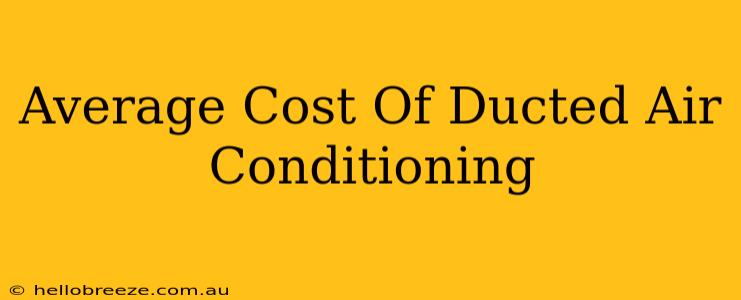Planning to install ducted air conditioning? Understanding the average cost is crucial for budgeting. This comprehensive guide breaks down the factors influencing the price, helping you make informed decisions.
What Influences the Cost of Ducted Air Conditioning?
Several factors significantly impact the final cost of your ducted air conditioning system. Let's explore them:
1. System Size and Capacity:
This is arguably the biggest factor. Larger homes or those with more rooms require larger, more powerful systems, leading to a higher price tag. The BTU (British Thermal Unit) rating determines the system's cooling capacity – higher BTU means higher cost. Accurate assessment of your home's size and insulation is essential for correct sizing. An undersized system will struggle, while an oversized one will be inefficient and expensive.
2. Type of System:
Several types of ducted systems exist, each with varying price points:
- Reverse-cycle systems: Offer both heating and cooling, typically more expensive upfront but save money in the long run.
- Single-zone systems: Cool or heat a single area, generally more affordable than multi-zone options.
- Multi-zone systems: Allow for independent temperature control in different areas, offering greater comfort and flexibility but at a higher cost.
Choosing the right system type for your needs is vital for optimizing both cost and comfort.
3. Installation Complexity:
The complexity of the installation greatly affects the overall cost. Factors such as:
- Accessibility of the space: Difficult-to-reach areas require extra labor and potentially specialized equipment, increasing the cost.
- Existing ductwork: If you have existing ductwork that can be reused, you can potentially save money. However, if extensive modifications or new ductwork installation is needed, costs will rise.
- Home design: Unusual home layouts or construction can add complexity to the installation process.
4. Brand and Features:
Different brands offer varying levels of quality, efficiency, and features. Premium brands often come with a higher price tag but may offer superior performance and energy efficiency. Features like smart home integration, Wi-Fi control, and advanced filtration systems also add to the cost.
5. Location and Labor Costs:
Labor costs vary significantly depending on your location. Areas with a higher cost of living tend to have higher labor rates. This impacts the installation costs, potentially increasing the overall expenses.
Average Cost Ranges: A General Overview
Providing a precise average cost is challenging due to the varying factors. However, you can expect the following general ranges:
- Basic system (small home, single zone): $4,000 - $8,000
- Mid-range system (average home, multi-zone): $8,000 - $15,000
- High-end system (large home, advanced features): $15,000+
These are estimates; it's crucial to get multiple quotes from reputable installers in your area.
Getting Accurate Quotes: Essential Tips
To get the most accurate quotes:
- Provide detailed information: Include your home's dimensions, desired system type, and any specific requirements.
- Get at least three quotes: Compare prices and services offered by different installers.
- Verify credentials and licenses: Ensure the installers are licensed and insured.
- Ask about warranties and maintenance: Understand the warranty coverage and the costs associated with regular maintenance.
By carefully considering these factors and obtaining multiple quotes, you can accurately budget for your ducted air conditioning installation and ensure a comfortable and efficient cooling system for your home. Remember, investing in a high-quality system is a worthwhile long-term investment that can improve your comfort and potentially save you money on energy bills.

